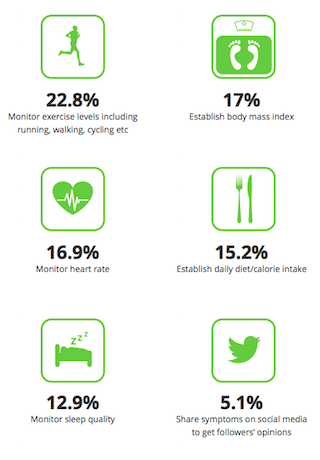 A couple of new reports from across the pond illustrate the ways doctors and patients are thinking about digital health in England, as well as in France and Germany. A new report from PushDoctor, a UK telemedicine company, shows that 58 percent of the 1,013 UK citizens surveyed have used some kind of health or wellness technology. And a report from healthcare marketing group Ipsos Health shows that 72 percent of the 131 primary care doctors interviewed in the UK, Germany, and France have already used or recommended at least one form of digital health technology with their patients.
A couple of new reports from across the pond illustrate the ways doctors and patients are thinking about digital health in England, as well as in France and Germany. A new report from PushDoctor, a UK telemedicine company, shows that 58 percent of the 1,013 UK citizens surveyed have used some kind of health or wellness technology. And a report from healthcare marketing group Ipsos Health shows that 72 percent of the 131 primary care doctors interviewed in the UK, Germany, and France have already used or recommended at least one form of digital health technology with their patients.
According to the PushDoctor report, 22.8 percent of patients use a smartphone, tablet, or computer to monitor exercise levels, 17 percent use such a device to establish BMI, 16.9 percent measure heart rate, 15.2 percent establish daily diet and calorie intake, 12.9 percent monitor sleep quality, and 5.1 percent share symptoms on social media to solicit friends' opinions.
When it comes to using technology to interact with doctors, though, the numbers drop off: 6.3 percent have shared biometric data with a doctor online, 5.1 percent have had a video consult with a doctor, 4.4 percent have had an email conversation with a doctor, and 4.0 percent have chatted online with a doctor.
Overall, patients have positive feelings about connected health tools, although they see them as more educational than interventional: 22.5 say online tools make them feel more in control of their wellbeing while 84.4 percent say they make them more aware of their wellbeing. Meanwhile, 16.3 percent fear connected health makes them too aware of their wellbeing and 12.8 percent say it makes them more worried.
According to the Ipsos Healthcare report, doctors are a little less enthusiastic than patients: most of them were unsure or ambivalent about many of the survey questions. Most did agree that health and lifestyle apps are here to stay-- just 20 percent think these apps are just a fad.
Asked whether mobile technology would replace routine checkups for chronic patients in the future, though, 26 percent disagreed while 13 percent agreed -- most were unsure. Similarly, 21 percent disagreed with the sentiment that "health and lifestyle apps for patients are key to improving patient adherence or compliance", but only 15 percent agreed with it. A full 37 percent disagreed -- and 10 agreed -- with the statement that compliance monitoring through apps will be a prerequisite for drug reimbursement in the future
While most questions spurred more disagreement than agreement, optimism about mobile health did win out on one question: 25 percent agree that health and lifestyle apps will become a part of treatment in the future, while just 13 percent disagree.
Just like patients in the PushDoctor survey worried that health data might make them more worried, a number of doctors were also concerned about negative effects: 27 percent of doctors are worried apps will create conflict between doctors and patients. Of those worried about technology, 66 percent worry patients will misinterpret data, 61 percent worry data will fuel patient hypochondria, and 53 percent worry about a lack of privacy and security.
Another connecting thread in European primary care physicians' responses was a general distrust of pharma.
For instance, 11 percent of doctors said they think pharma should have a leading role in developing apps, while 23 percent think it shouldn't -- most were on the fence. For medication information, 61 percent of doctors visit general websites, while only 46 percent pharma websites. Forty percent of doctors said they didn't trust an app developed by pharma, compared to 24 percent who didn't trust an app developed by a technology company.


















